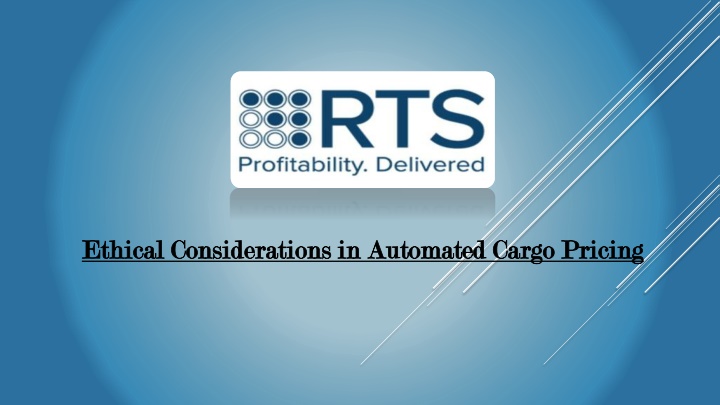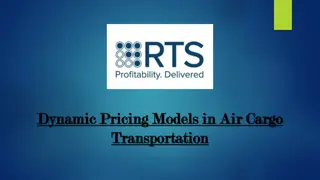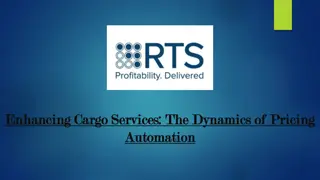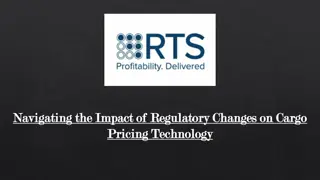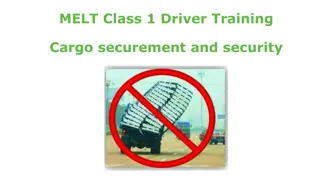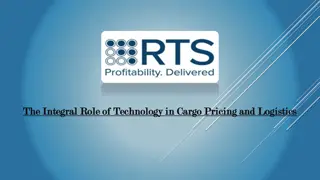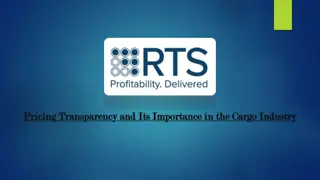Ethical Considerations in Automated Cargo Pricing
In the rapidly evolving landscape of logistics and transportation, the integration of technology such as dynamic pricing algorithms has revolutionized how companies manage and adjust cargo pricing. This automation offers immense benefits, including optimized pricing strategies, enhanced revenue management, and improved customer satisfaction.
Download Presentation

Please find below an Image/Link to download the presentation.
The content on the website is provided AS IS for your information and personal use only. It may not be sold, licensed, or shared on other websites without obtaining consent from the author.If you encounter any issues during the download, it is possible that the publisher has removed the file from their server.
You are allowed to download the files provided on this website for personal or commercial use, subject to the condition that they are used lawfully. All files are the property of their respective owners.
The content on the website is provided AS IS for your information and personal use only. It may not be sold, licensed, or shared on other websites without obtaining consent from the author.
E N D
Presentation Transcript
Ethical Considerations in Automated Cargo Pricing Ethical Considerations in Automated Cargo Pricing
In the rapidly evolving landscape of logistics and transportation, the integration of technology In the rapidly evolving landscape of logistics and transportation, the integration of technology such as dynamic pricing algorithms has revolutionized how companies manage and adjust such as dynamic pricing algorithms has revolutionized how companies manage and adjust cargo pricing pricing. This automation offers immense benefits, including optimized pricing strategies, . This automation offers immense benefits, including optimized pricing strategies, enhanced revenue management, and improved customer satisfaction. However, as with any enhanced revenue management, and improved customer satisfaction. However, as with any technological advancement, the implementation of automated cargo pricing systems by companies technological advancement, the implementation of automated cargo pricing systems by companies like Revenue Technology Service raises important ethical considerations that must be addressed to like Revenue Technology Service raises important ethical considerations that must be addressed to ensure fairness, transparency, and accountability ensure fairness, transparency, and accountability. . cargo
1. Transparency in Pricing Algorithms 1. Transparency in Pricing Algorithms One of the primary ethical concerns with automated cargo pricing is transparency. Companies must strive to make their pricing mechanisms as transparent as possible to customers and regulatory bodies. In the realm of dynamic pricing, where prices are adjusted in real-time based on demand, supply, and other market factors, it is crucial for customers to understand why and how prices are being altered. Transparency not only builds trust between the service providers and their clients but also helps in avoiding misunderstandings and disputes over pricing. Moreover, it ensures that companies uphold ethical standards by not engaging in practices such as price discrimination or price gouging, especially during times of high demand or crisis situations. 2. Avoiding Discriminatory Pricing Practices 2. Avoiding Discriminatory Pricing Practices Ethical automated cargo pricing must avoid discriminatory practices that could unfairly penalize or benefit certain groups of customers. Dynamic pricing models, driven by algorithms, must be designed to ensure that no individual or business is unfairly treated based on location, demand patterns, or purchasing power. This involves constant monitoring and updating of algorithms to ensure they do not inadvertently become biased. The challenge lies in balancing profitability with ethical responsibilities. It is vital for businesses to conduct regular audits of their pricing algorithms to ensure fairness and to adjust any elements that may lead to discriminatory outcomes. 3. Data Privacy and Security 3. Data Privacy and Security Implementing automated systems for cargo pricing inevitably involves the collection and analysis of large volumes of data. This raises significant concerns regarding data privacy and security. Ethical practices dictate that companies must ensure stringent measures are in place to protect sensitive information from breaches and unauthorized access. Furthermore, customers should be clearly informed about what data is being collected, how it is being used, and whom it is shared with. Upholding high standards of data privacy is not just a legal obligation but a critical element of corporate responsibility that fosters long-term customer trust.
4. Impact on Small Businesses 4. Impact on Small Businesses Another ethical aspect to consider is the impact of dynamic and automated cargo pricing on small businesses. Large corporations might easily adapt to price changes due to their greater financial buffer, whereas small businesses might find rapid price fluctuations more challenging. Ethical cargo pricing should include measures that prevent such technologies from disproportionately affecting smaller players in the market. Options could include tailored pricing strategies, longer-term contracts with fixed prices, or providing tools and resources to help small businesses better predict and manage transportation costs. These strategies ensure a level playing field, promoting healthy competition and innovation across all market segments. 5. Accountability and Continuous Improvement 5. Accountability and Continuous Improvement Finally, accountability in automated cargo pricing systems is crucial. Companies like Revenue Technology Service must not only comply with existing laws and regulations but also actively engage in setting higher standards for ethical practices in technology use. This includes being accountable for the decisions made by their pricing algorithms. Continuous improvement should be a core aspect of the ethical deployment of such technologies. This means regularly revisiting and refining algorithms based on feedback, market changes, and ethical considerations to enhance fairness and effectiveness.
Conclusion Conclusion As automated and dynamic pricing becomes more prevalent in the cargo industry, it is imperative for companies to navigate the complex ethical landscape that accompanies these technologies. Transparency, fairness, data security, and proactive engagement with all stakeholders are essential to ensure that technological advancements contribute positively to the industry and society at large. By prioritizing these ethical considerations, companies can harness the benefits of automation while maintaining trust and integrity in their business practices.
THANK YOU THANK YOU
